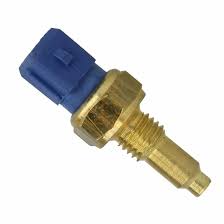Description :
A used car temperature sensor is a crucial component in an automobile's engine management system designed to monitor and regulate the temperature of various engine components. Maintaining the optimal operating temperature is essential for the engine's efficiency, performance, and longevity.
1. *Function:*
- Temperature Monitoring: The primary function of the used sensor is to measure the temperature of the engine coolant or other relevant components.
- Feedback: The used sensor provides real-time data to the Engine Control Unit (ECU) or Engine Control Module (ECM), allowing the system to make adjustments to maintain the desired temperature range.
2. *Types of Temperature Sensors:*
- Coolant Temperature Sensor: Monitors the temperature of the engine coolant.
- Intake Air Temperature Sensor: Measures the temperature of the incoming air into the engine.
- Oil Temperature Sensor: Monitors the temperature of the engine oil.
3. *Location:*
- Coolant Temperature Sensor: Often located near the engine's thermostat housing or on the cylinder head.
- Intake Air Temperature Sensor: Positioned in the air intake system, typically near the air filter.
- Oil Temperature Sensor: Located in or near the engine's oil system, such as in the oil pan or on the oil filter housing.
4. *Sensor Technology:*
- Thermistor: Commonly used in temperature sensors, a thermistor changes its electrical resistance with temperature variations.
- Infrared Sensors: Some advanced systems use infrared technology to measure temperature without direct contact.
5. *Warning Systems:*
- Dash Indicator: If the engine temperature exceeds safe levels, the used sensor triggers a warning light on the vehicle dashboard.
- Engine Protection: In some cases, the ECU may take preventive measures, such as reducing engine power or shutting down cylinders, to prevent overheating.
6. *Importance:*
- Efficiency: Maintaining optimal temperature ensures efficient combustion, fuel efficiency, and overall engine performance.
- Durability: Proper temperature regulation contributes to the longevity of engine components, preventing damage caused by overheating.
7. *Maintenance:*
- Testing: Periodic testing and replacement of faulty sensors are essential for ensuring accurate temperature readings.
- Coolant Level: Low coolant levels can affect sensor accuracy, so it's important to maintain the proper fluid levels.
In summary, a used car temperature sensor plays a critical role in regulating engine temperature, optimizing performance, and preventing damage due to overheating. Regular maintenance and monitoring of these sensors contribute to the overall health and efficiency of the vehicle.


